The car warning lights are a series of coloured lights that indicate there might be a problem with your car. These follow a traffic light colour system:
- Red: indicates there is a serious, potentially dangerous issues - you should stop the car when it's safe and get it checked by a professional mechanic
- Yellow/Orange: something is wrong that needs to be checked but it's not as urgent as a red light - take extra care and get it looked at when you can
- Green/White/Blue: the system is working correctly or is currently in use
When you start your vehicle it is quite normal for warning lights to illuminate briefly before switching off again. However, if one or more of these lights remain on then you may have a serious issue.
Hopefully you won't see these warning lights anytime soon, but in case you do, ensure you have RAC Breakdown Cover. Travelling abroad? Get RAC European Breakdown Cover incase you see warning lights on your car on your trip away.
RAC Mobile Mechanics also offer repairs and diagnostics, which will identify the cause of your car's warning light and ensure it is repaired to the highest standard.
Engine management light
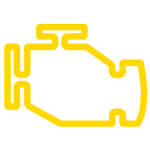
The check engine light or ECU warning light is a warning symbol that most drivers dread. When the engine management light is on, it may be accompanied by a loss of power or engine stuttering as you press the accelerator.
This light can be linked to something relatively minor, like a broken electrical sensor or loose wire. But it's important to have the check engine warning light investigated as it may be linked to a much larger mechanical issue, like a fault with the emission control system or catalytic converter.
How long can I drive with my check engine light on?
If the check engine light comes on you should get it checked as soon as you can, as by continuing to drive you risk causing further, potentially irreparable damage to your engine.
Use our search tool to find your nearest RAC approved garage to book your next MOT. Or, if you have RAC Breakdown Cover, call for recovery.
Battery warning light
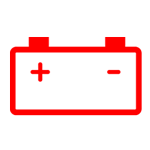
Has your battery warning light come on? It may indicate the battery is not charging or a fault is present. This could be due to a problem with your car’s electrical system, such as a faulty alternator, bad electrical connection or damaged cabling. The battery itself may be faulty or worn out.
Can I still drive with my battery charging system light on?
You should not drive if the battery warning light is on. It may result in a break down caused by a sudden power failure.
If the battery warning light has come on then you should get the car checked by a qualified mechanic as soon as possible. You can arrange for a mobile mechanic to visit your home or place of work. If you do run out of charge, you can try to jump start it, or call for recovery if you have RAC Breakdown cover.
Find out more information about what to do if you have a flat battery and how to tell here.
Brake warning light
Also known as the brake system warning light, parking brake warning light or brake fluid warning light. This dashboard light usually has an exclamation mark encased in a circle and two brackets.
If this light comes on then it suggests there is an issue with your braking system, this could relate to low brake fluid (if the light remains red after releasing the parking brake) or even worn brake pads (if your brake pads squeak or pulse).
If the ABS warning light is also illuminated this signals that the braking system has malfunctioned and your brakes may not work properly. In this case the Electronic Brake Force Distribution (EBD) warning light may also be illuminated.
Can I still drive with my brake car warning light on?
The brakes are one of the most important safety features of your car, you should not drive if you see a red car warning light.
Pull over and stop as soon as it’s safe to do so - keep your speed low and avoid braking suddenly. Unless you know how to check your brake fluid levels yourself, this will be one for the professionals, so get yourself to a garage.
Don’t risk driving when your brakes are not functioning properly: call for recovery if you have a breakdown cover policy.
Coolant levels warning light

The yellow coolant warning light will come on when coolant levels are running low, to remind you to top them up.
Coolant fluid absorbs the heat from your engine and disperses it through the radiator to prevent your engine from overheating.
Can I still drive with my coolant level light on?
You should not drive a vehicle without sufficient coolant. If the yellow warning light is on, stop and top up as soon as possible otherwise you risk causing serious damage to your car. But you must wait for the engine to cool down before topping up. Read our guide to checking your engine coolant.
If this light comes on often, get your car serviced to check there isn’t a leak somewhere.
Airbag warning light

The airbag warning light will turn red when at least one element of the airbag safety system is not working correctly: either the airbag system itself; the front passenger occupant classification system (which detects the front passenger’s weight and position in order to safely deploy the airbag); or the seat belt pretensioner system, which tightens the belt in the event of a crash.
Can I still drive with my airbag light on?
No, you should not drive your vehicle if the red airbag warning light is on. If the airbag system is not working properly, it may not go off in a crash - or in some cases it could even deploy unexpectedly and cause a crash.
Either way, the airbag system is an incredibly important safety feature of your car so if this light comes on please get it checked out immediately.
Car troubles?
Book a diagnostic test with us today. RAC Mobile Mechanics will check your car for faults, talk you through any repairs you might need, and give you a report for your records.


Power steering warning light
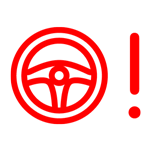
This warning light will come on when there is a problem with the power steering. For electric powered systems, this problem could be as simple to fix as rebooting a computer. Find a safe place to stop and try turning the car off and back on again after 30 seconds.
If the light stays on you should take your car to get checked as soon as possible as there may be a more serious issue with the vehicle.
Can I drive with my power steering warning light on?
It is not advisable to drive a vehicle with the red power steering warning light on. If the power steering system fails you will notice that the car is harder to manoeuvre and it could be dangerous to drive.
Diesel particulate filter warning light

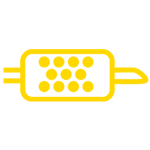
Also known as the DPF or exhaust particulate filter warning light, this yellow symbol affects diesel cars and comes on when the system has become blocked with soot and needs an exhaust repair.
The warning light may come on due to a blockage within the filter or be caused by the unit being filled with soot.
Can I still drive with my DPF light on?
You should go to a garage to get it checked as soon as you can, as DPF filters can be expensive to replace. As well as releasing a plume of toxic black smoke every time you press the accelerator, driving with a blocked filter could cause more serious damage to your car.
Learn more about diesel particulate filters and how to maintain them.
Engine temperature warning light
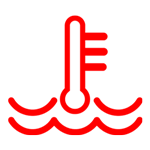
Also known as the coolant temperature car warning light, the red engine light will come on when the engine is overheating. This could mean that coolant levels are running low, perhaps due to a leak in the system, or it could be a sign of a larger problem, like a head gasket failure.
Can I still drive with my engine overheating light on?
If the red engine temperature warning light is on, you should stop straight away as without enough coolant your engine could get so hot that it effectively welds itself together, causing irreparable damage.
Stop and wait until the engine has cooled off before checking the gauge on the side of the coolant tank under the bonnet, topping up as required. Read our guide to checking your engine coolant.
Have a look to see if there are any obvious leaks. If you can’t see any and the light goes off after topping up then you should be fine to continue your journey. If the light comes back on again after topping up you should get it checked out to fix the underlying problem.
An overheating engine can cut out as well. Rather than risk it, you should call for recovery if you have breakdown cover.
Get a service or repair at home
RAC Mobile Mechanics can come to you, saving you the hassle of going to a garage.


Oil warning light

The oil warning light comes on when either the oil temperature gets too high or the oil level or pressure is too low. If the oil is not lubricating the engine effectively it could lead to expensive or even irreparable engine damage, so it’s important to act quickly.
Can I still drive with my low engine oil light on?
If the low engine oil light is on then you should stop as soon as safely possible and switch off the engine. Have a look for any obvious oil leaks under the car, and check the oil levels, topping up if necessary.
If the oil levels are fine, then the oil pump may be faulty. In this case call for recovery if you have breakdown cover, as driving any further could damage the engine. Watch our video guide to checking your car’s engine oil.
If the light comes back on again after topping up you should get it checked out at a garage to fix the underlying problem.
Low tyre pressure warning light

The yellow low tyre pressure warning light will illuminate if a problem is detected with one or more of your vehicle's tyres. Many cars are now fitted with tyre pressure monitoring systems that will let you know when the pressure falls. This could happen over time or it could be because of a puncture or damage to the tyre.
Can I still drive with my tyre pressure light on?
No, you should stop as soon as it is safe to do so and check the pressure of your tyres. Low tyre pressure can cause unsafe driving conditions so reduce your speed, and try to avoid braking suddenly or making any violent steering manoeuvres.
Most petrol stations and garages will have an air compressor you can use to check your tyre pressure. Top up the air in the tyres according to the vehicle manufacturer specification in your owner's manual.
If you have a puncture, watch our video to learn how to change a tyre in 10 simple steps.
Anti-lock brake system (ABS) warning light
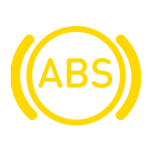
The yellow ABS (Anti-lock brake system) warning light will come on when there is a fault detected with the system. ABS is an important safety feature that really comes into play when you need to make an abrupt stop, or in difficult driving conditions like icy roads.
Can I still drive with my ABS light on?
If the ABS light comes on by itself you should still have normal, unassisted braking, so it's safe to continue your journey – but keep your distance, take extra care, and get it checked as soon as possible.
If it comes on with the brake warning light, it could indicate that the brake system is failing and you should stop straight away and call for recovery if you have breakdown cover.
For roadside assistance, you can call the RAC on 0330 159 1111 even if you’re not a member.
How do you typically detect issues in your vehicle?
Electronic stability problem (ESP) warning light
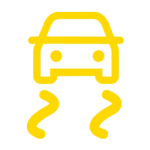
Also called Electronic Stability Control (ESC), this car warning light indicates a problem with traction control. If it’s flashing it means the ESP system is intervening – for example, if you’re driving on a slippery road. If the light stays on it means the ESP system is not working properly.
The ESP light will light up with the word ‘OFF’ if the system has been deactivated, in which case you may have inadvertently turned it off.
To check, try stopping and restarting the engine. If the light remains on after restarting get it checked at a garage as the ESP system is an important safety feature.
Brake pad warning light

Also called the brake pad wear warning light, if this symbol shows up it means a sensor has detected your brake pads are worn.
Can I drive with my brake pad light on?
This car warning light should come on before the brake pads become dangerously thin, so you have time to get them changed. You should replace as soon as you can though, as if they wear out completely it could be extremely dangerous.
For more information read our guide to brake pads.
Hopefully you won't be seeing these car warning lights anytime soon, but do make sure you have breakdown cover, van breakdown cover or business breakdown cover in case it does happen!
How to reset or turn off car warning lights
If you have had a car warning light appear on your dashboard, then you know you have an issue with your vehicle.
After visiting a local garage or calling out a mobile mechanic, the problem should be resolved.
However, after the repair is complete – the light could remain on. It may be necessary to reset your onboard computer.
This could be done by opening and closing the bonnet and then turning your vehicle on and off. However, if it still remains on, you may need to disconnect and then reconnect your battery.
In some cases, it may be that you will need to drive for a while for the car to reset itself.
If the lights remain, the issue may still be there or another one could be impacting your vehicle.
A mechanic will know how to fix the problem, and reset the computer if necessary.

Breakdown cover from £5.29 a month for Standard cover*
• Cheaper than AA Price Promise or we’ll beat it by 20%^
• We get to most breakdowns in 60 mins or less
• Our patrols fix 4/5 breakdowns on the spot

Services we offer
- Breakdown Cover
- European Breakdown Cover
- Motorbike Breakdown Cover
- Electric Car Breakdown Cover
- Caravan, Motorhome and Campervan Breakdown Cover
- Business Breakdown Cover
- Van Breakdown Cover
- RAC Approved Garages
- Vehicle servicing
- Vehicle repair
- MOTs
- Mobile mechanics
- RAC Tyres
- RAC Approved Dealers
- RAC Shop
- myRAC app
Car dashboard warning lights FAQs
- Can you drive with engine warning light on?
Yes, you can continue to drive your car if the engine warning light comes on. However, you should visit a local garage or call a mobile mechanic as soon as possible. If the light is accompanied with other issues, stop immediately and call your local garage or breakdown provider.
- What causes an engine light to come on?
There are many reasons why your engine warning light might turn on. These include airflow to the engine, faulty sensors, overheating, faulty ignition, blocked fuel injectors or fuel pump, issues with the catalytic converter or DPF or an electrical fault. Speak to a mechanic as soon as possible.
- What does a yellow engine management light mean?
As the less serious warning light, this means you can continue to drive, but that you should speak to a mechanic as soon as possible. Issues may include problems with the fuel system, blocked filters, electrical faults or a lack of airflow to the engine.




















